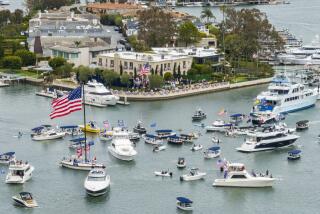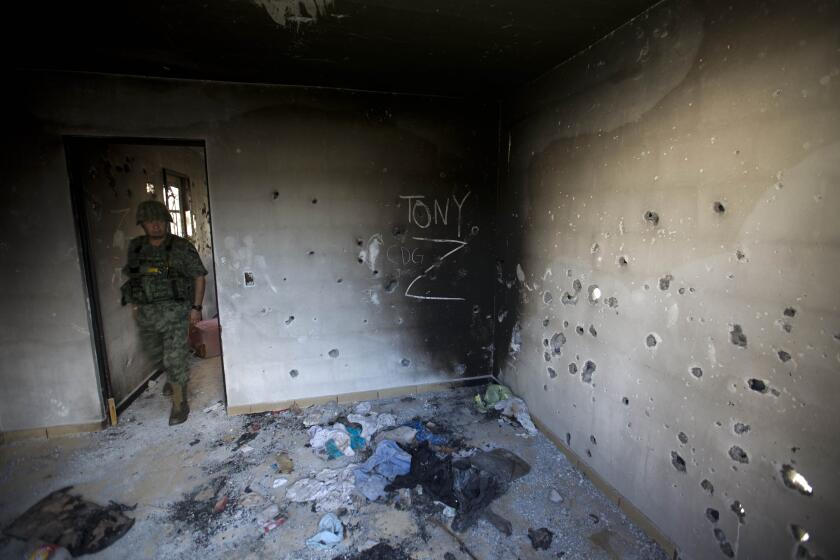Bike-Aid Cyclists Near Finish Line : Riders 11 Days Out of New York Amass $30,000 in Pledges
With six weeks of their 3,000-mile, cross-country journey behind them and only 11 days of pedaling that lie ahead to New York, Bike-Aid ’86 cyclists report $30,000 raised in $1-a-mile pledges, a wealth of good and bad experiences and only one casualty, a serious, off-road foot injury.
Ten cyclists who took off June 16 from Santa Monica are among about 65 riders on five routes who are scheduled to rendezvous Tuesday in Washington for a day of rest before continuing on to the journey’s end in Manhattan, where Mayor Edward Koch has agreed to proclaim their arrival date, Aug. 11, Global Partnership Day.
In a telephone interview Monday from Marshall University in Huntington, W. Va., Joel Treisman, 25, fund-raising coordinator for Stanford University-based Bike-Aid, reported that riders had found “incredible generosity and hospitality” along their route, had weathered Southeastern heat and humidity that was like “wearing a wet blanket” and had found shelter in a rescue mission, a Benedictine monastery and an Eagles lodge.
And, he said, neither heat nor humidity nor a steady diet of Gatorade and peanut butter sandwiches had discouraged the cyclists who are are pedaling in support of the Overseas Development Network, a national student organization that sponsors long-term self-help projects to aid the impoverished.
Scaled-Down Goal
At one time envisioned by organizers as a super-cycle attracting 100,000 riders, Bike-Aid was scaled down to a goal of 100 riders (of which it fell about 35 short) and $300,000, following closely on the heels of Hands Across America, a mega-event to help the homeless.
For the hardy 65 cyclists, Treisman said, the challenges have been both physical--the hills and 115-degree heat of the California-Arizona desert--and the inevitable interpersonal conflicts that arise when strangers are thrown together.
One woman has dropped out “for personal reasons,” Treisman said, and the San Francisco-based contingent lost two riders to bursitis and knee problems, but picked up two more riders along the route. James Cano, 22, of the Los Angeles group was forced to fly home from Louisville, Ky., when damage to his foot ligaments made it impossible for him to continue.
“He was in a rush to go out to dinner,” Treisman said, “and was jumping eight stairs at a time. He fell on his foot the wrong way.”
The 10 Los Angeles-based cyclists, who dubbed themselves the Desert Rats, are making between 60 and 100 miles a day on a route that has taken them from Santa Monica through the old U.S. 66 cities of Kingman, Ariz., Gallup, N.M., Albuquerque, Amarillo, Tex., and Oklahoma City. They spent a day of rest Wednesday in Charleston, W. Va., before pushing on today to Lewisburg, W. Va.
Washington Linkup
In Washington they will converge with riders who set out six weeks ago from San Francisco, Portland, Ore., and Seattle as well as a Southern contingent whose journey began in mid-July.
Highlights have included breaking bread with the Benedictine monks who housed riders at their abbey in St. Meinrad, Ind., and camping out in the yard of a mini-mart clerk in Clovis, N.M., who on the spur of the moment invited the group to her daughter’s 16th birthday party.
There have been unanticipated financial setbacks, including major mechanical problems with support vehicles carrying the bikers’ belongings and supplies and $200 to replace a rifle reportedly stolen from a borrowed pickup truck. “We’ve hit a lot of bike shops for repairs,” Treisman said.
He said none of the money pledged by sponsors--$30,000 to date--will be used for operating costs. But he said anyone wanting to help with those expenses may do so. (Write: Bike-Aid ‘86, Owen House, Stanford 94305.)
Wherever they go, he said, “We’ve been able to generate a lot of spirit and enthusiasm. It’s infectious. It’s been amazing--these are some of the people that we’re trying to help, people obviously not well off, and they are giving us a dollar, 50 cents.”
Bike-Aid’s goal is threefold--to raise the consciousness of Americans to the problems of world hunger and poverty, to raise money for self-help projects in Appalachia and Third World countries and to establish internships to send deserving American students to the poorest countries to work and learn. Some funds also are earmarked for small international development organizations that share the network’s philosophy of small-scale assistance.
More to Read
Sign up for Essential California
The most important California stories and recommendations in your inbox every morning.
You may occasionally receive promotional content from the Los Angeles Times.










